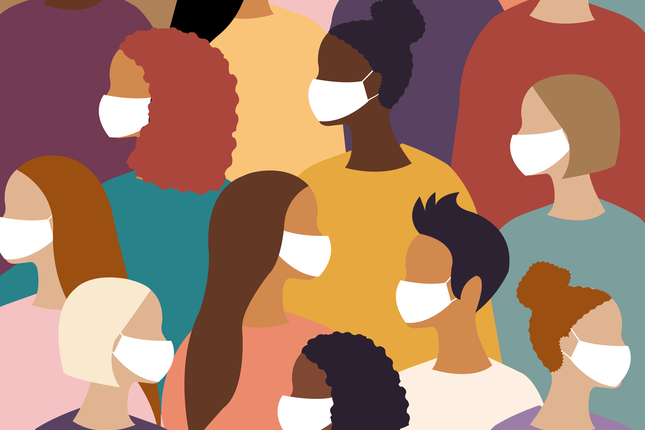-
The Lasting Effects of the COVID-19 Pandemic on Women’s Work, Health, and Safety (New Report)
March 2, 2022 By Chanel Lee
While the COVID-19 pandemic has affected the lives of many around the world, its effects on women have been particularly devastating. Even before the pandemic, women are highly affected by violence. Since the pandemic, rates of gender-based violence have risen, while uptake of critical health services have decreased. Women, especially low-income women, women of color, and migrant women, are also more likely to work in jobs that are underpaid, undervalued, and unprotected, and they comprise the majority of the frontline or “essential” workforce, which includes grocery and food retail workers, health care workers, and care workers.

“Without action, COVID-19 is poised to have devastating and long-term impacts on women’s health and economic standing and, by extension, on the health of societies and economies as a whole. Because of intersecting axes of oppression, marginalized populations will disproportionately bear the burdens of these negative effects. Gender proactive policy responses are needed to stave off the worst of these effects, safeguard decades of progress toward gender equality, and lay the foundation for a healthier, more equitable, and more prosperous future.” – The Lasting Effects of the COVID-19 Pandemic on Women’s Work, Health, and Safety
While the COVID-19 pandemic has affected the lives of many around the world, its effects on women have been particularly devastating. Even before the pandemic, women are highly affected by violence. Since the pandemic, rates of gender-based violence have risen, while uptake of critical health services have decreased. Women, especially low-income women, women of color, and migrant women, are also more likely to work in jobs that are underpaid, undervalued, and unprotected, and they comprise the majority of the frontline or “essential” workforce, which includes grocery and food retail workers, health care workers, and care workers.
Essential workers have been at the greatest risk of contracting COVID-19 during the pandemic due to occupational exposure, leaving women disproportionately impacted. Of essential workers, paid and unpaid care workers, in particular, have largely been excluded from discussions around worker safety and pandemic recovery. With school closures and job losses, many parents, particularly mothers, have had to care for their children and loved ones with little support. Increased care responsibilities can worsen or lead to physical and mental health ailments, on top of the already adverse health outcomes associated with COVID-19. Furthermore, women are being pushed out of the workforce in droves, further widening the gender wage gap. Taken together, the COVID-19 pandemic has further challenged women’s health, safety, and economic empowerment. In spite of these negative impacts, few policy efforts have been implemented to remedy the consequences of the COVID-19 pandemic on women.
In The Lasting Effects of the COVID-19 Pandemic on Women’s Work, Health and Safety, Sarah B. Barnes, Deekshita Ramanarayanan, and Sara Matthews from the Wilson Center’s Maternal Health Initiative (MHI) examine the effects of the COVID-19 pandemic on women’s health, safety, and work; highlight existing domestic and global recovery plans that address the gendered impacts of the pandemic, and offer recommendations for the inclusion of gender-sensitive policymaking.
The Lasting Effects of the … by The Wilson Center
In this report, the authors identify COVID-19 recovery plans from the United States and globally. Commonalities across these plans include addressing gender-based violence, supporting gender equity in the workplace and in leadership positions, strengthening paid leave and other worker protections, and boosting social infrastructure (e.g., childcare, healthcare, and education). Policies from Canada and Northern Ireland include the effects of racial discrimination and social inequity in their attempt to eliminate the structural barriers to women’s empowerment. Policies from Hawaii and the African Union outline provisions for specific groups of women including survivors of gender-based violence and health workers. Recognizing that some women face greater challenges than others due to systemic oppression and intersecting marginalized identities, the authors stress that successful recovery plans must adopt a comprehensive, intersectional lens.
Taking these plans and policies into consideration, the authors propose similar strategic recommendations around health, safety, employment, and care work to inform future policymaking and implementation.
Strategies to address the impact of the COVID-19 pandemic on women:
- Create gender proactive recovery plans that include gender-responsive employment policies to address the effects of COVID-19 on women’s work, health, and safety.
- Protect all women workers through policies and practices that are gender-inclusive and include women in informal, vulnerable, and/or unregulated employment, migrant women, women with disabilities, and pregnant and lactating women. Recovery plans must also prioritize healthcare workers’ health, safety, and support.
- Support and recognize caregivers, both paid and unpaid. Women left the workforce due to the high demand for caregiving caused by school closures, home elder care, and limited resources for both COVID-19 and non-COVID-19 related illnesses. Redistribute care work responsibilities equally between parents regardless of gender.
Throughout the COVID-19 pandemic, women have been adversely impacted in a myriad of ways. These disproportionate effects on women’s health, safety, and work all point to a clear need for intersectional approaches to address the gendered impacts of the pandemic, as well as future health, economic, or social crises.
Authors
Sarah B. Barnes is the Project Director of the Wilson Center’s Maternal Health Initiative. Sarah holds a Master’s degree in Women’s Studies and a Master’s degree in Public Health focused on Reproductive Health and Community Assessment.
Deekshita Ramanarayanan is the Program Coordinator of the Wilson Center’s Maternal Health Initiative. Deekshita holds a Master’s degree in Public Health focused on Maternal and Child Health.
Sara Matthews (at the time of publishing) is a Kimpton Fellow working with the Wilson Center’s Maternal Health Initiative and Office of Scholars and Academic Relations. Sara holds a Bachelor’s degree in Public Policy Studies with a specialization in Human Rights.
Read More:
- Women’s work is essential to society and the economy.
- Pandemic recovery must include policies to support women’s labor and care work.
- Caregivers report feeling more burnt out than ever before during the COVID-19 pandemic.
Sources: African Union, Brookings, Center for American Progress, Center for Disease Control and Prevention (CDC), Embracing Carers, Hawaiʻi State Commission, International Labour Organization (ILO), UN Women, United Nations Children’s Fund (UNICEF), Women’s Resource and Development Agency (WRDA), Young Women’s Christian Association of Canada (YWCA).
Photo Credit: Different Women Female Diverse Faces In Mask Poster. iadams/Shutterstock.com.
 A Publication of the Stimson Center.
A Publication of the Stimson Center.







